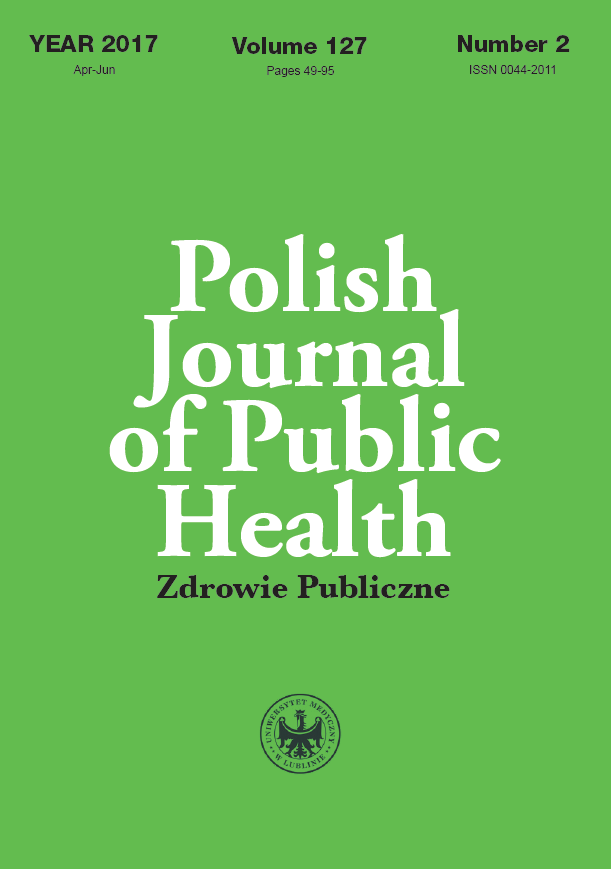Controversial alternative diets in the light of current dietary recommendations for overweight and obesity treatment
DOI:
https://doi.org/10.1515/pjph-2017-0020Keywords:
obesity, alternative diets, dietary guidelines in treatment of obesity, principles of healthy eatingAbstract
The objective of the study is a critical analysis of the selected alternative diets used in the treatment of obesity inconsistent with the recommended standards, from the perspective of clinical dieticians, based on up-to-date guidelines for dietary management of obesity. Attention was paid to the assumptions of the selected alternative diets, some physiological mechanisms related with their use, as well as the deficit of data pertaining their distant effectiveness and safety. In the context of the current epidemiological situation concerning the prevalence of obesity, it is justifiable to undertake actions aimed at the professionalization of dietary management in obesity, consisting in the application of the treatment methods based on data generated in the EBM paradigm, with a simultaneous indication and criticism of dietary pseudo-therapies with unconfirmed curative value which, in addition, do not guarantee the reduction of the risk of metabolic complications of obesity.
References
1. WHO. Obesity: preventing and managing the global epidemic. Report of a WHO Consultation. WHO. Technical Report Series 894. Geneva: World Health Organization; 2000.
2. WHO. 2014. Global status report on noncommunicable diseases; 2014.
3. Gajewska D, Bawa S, Myszkowska–Ryciak J. Strategie leczenia dietetycznego otyłości – czy istnieje optymalna dieta? KOSMOS Probl Nauk Biol. 2010;59(3-4):285-93.
4. Kwiatkowska O, Skop-Lewandowska A. Popularność stosowania diet redukcyjnych wśród kobiet w wieku 19-39 lat. Med Ogólna Nauki o Zdr. 2015;21(3):307-31.
5. Łagowska K, Woźniewicz M, Jeszka J. Ocena wartości odżywczej diet odchudzających zamieszczonych na portalach internetowych. PHiE. 2011;92(4):824-7.
6. Białkowska M. Otyłość. In: M. Jarosz (ed.) Praktyczny podręcznik dietetyki. Warszawa: IŻŻ; 2010. p. 335-41.
7. Sacks FM, Bray GA, Carey VJ, et. al. Comparison of weight-loss diets with different compositions of fat, protein, and carbohydrates. N Engl J Med. 2009;360:859-73.
8. Zespół ds. leczenia otyłości u osób dorosłych Polskiego Towarzystwa Dietetyki: Gajewska D, Myszkowska-Ryciak J, Lange E, et al. Standardy leczenia dietetycznego otyłości prostej u osób dorosłych. Stanowisko Polskiego Towarzystwa Dietetyki 2015. Dietetyka. 2015;8(Wyd. Spec):5-21.
9. Garvey WT, Mechanick JI, Brett EM, et al. American Association of Clinical Endocrinologist and American College of Endocrinology Comprehensive Clinical Practice Guidelines for Medical Care of Patients with Obesity. Endocrine Pract. 2016;22(7):842-84.
10. Yumuk V, Tsigos C, Fried M, et. al. European Guidelines for Obesity Management in Adults. Obes Facts. 2015;8:402-24.
11. Tsigos C, Hainer V, Basdevant A, et al. Postępowanie w otyłości dorosłych: europejskie wytyczne dla praktyki klinicznej. Endokrynol Otyłość Przem Mat. 2009;5(3):87-98.
12. Fried M, Yumuk V, Oppert JM, et. al. Interdisciplinary Eurroepan Guidelines on Metabolic and Bariatic Surgery. Obes Facts. 2013;6:449-68.
13. Olszanecka-Glinianowicz M. Leczenie farmakologiczne otyłości w świetle aktualnych wytycznych American Association of Clinical Endocrinologists i American College of Endocrinology 2016. Med Prakt. 2017;1:52-61.
14. 2016 European Guidelines on cardiovascular disease prevention in clinical practice. The Sixth Joint Task Force of the European Society of Cardiology and Other Societies on Cardiovascular Disease Prevention in Clinical Practice (constituted by representatives of 10 societies and by invited experts). Eur J Prev Cardiol. 2016;23(11):NP1–NP96.
15. Jarosz M. Normy żywienia dla populacji polskiej – nowelizacja. Warszawa: IŻŻ; 2012. p. 86-142.
16. Białokoz-Kalinowska I, Zapolska J, Piotrowska-Jastrzębska J. Kontrowersje w leczeniu dietetycznym otyłości. Pediatr Med Rodz. 2008;4(4):253-256.
17. Kiedrowski M, Gajewska D. Co powinien wiedzieć lekarz rodzinny o popularnych „dietach odchudzających” i samym odchudzaniu? Med Rodz. 2013;3:95-8.
18. Zachorska-Markiewicz B. Kontrowersje wokół diet. Endokrynol Otyłość Zab Przem Mat. 2005;1(1):9-14.
19. Ruxer J, Mozdzan M, Loba J. Dieta Atkinsa a leczenie otyłości. Adv Clin Exp Med. 2005;14(5):1027-32.
20. Szostak WB, Białkowska M, Cichocka A, et al. Ocena zasadności „Diety Optymalnej” w profilaktyce metabolicznych chorób cywilizacyjnych. Warszawa: IŻŻ; 2004. p. 59-71.
21. Szczuko M, Pieszak N, Jamioł-Milc D, Stachowska E. Dieta proteinowa w świetle zasad racjonalnego żywienia. Analiza składu jadłospisów. Pomeranian J Life Sci. 2016;62(2):31-8.
22. Wyka J, Malczyk E, Misiarz M, et al. Assessment of food intakes for women adopting the high protein Dukan diet. Rocz PZH. 2015; 66(2):137-42.
23. Białkowska M. Leczenie dietetyczne – ciągle aktualna metoda terapii otyłości. Post Nauk Med. 2013;XXVI(5B):38-43.
Downloads
Published
Issue
Section
License
Copyright (c) 2018 Polish Journal of Public Health

This work is licensed under a Creative Commons Attribution-NonCommercial-NoDerivatives 3.0 Unported License.


